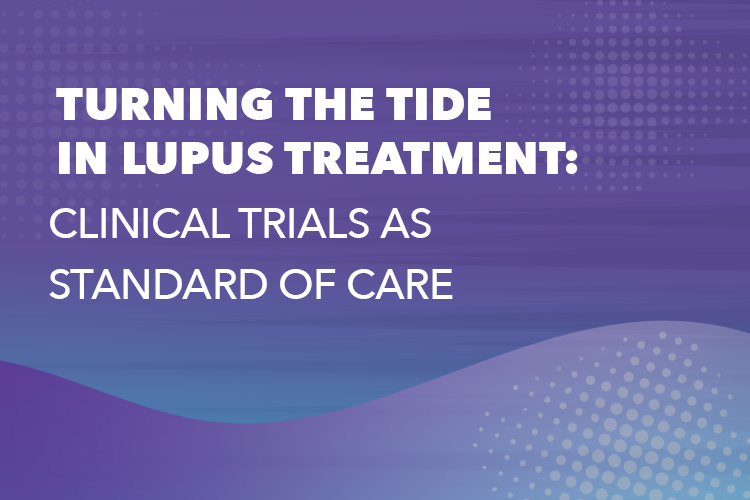
LRA Spotlight on ACR Convergence 2024: Lupus Therapeutics-Supported Clinical Research and More
New ACR guidelines for advancing the management of lupus nephritis (LN). Novel approaches and promising data from early- to late-stage lupus treatments in development, including CAR T cell therapies. Strategies for promoting equity in lupus clinical trials.
These were among the key presentations at ACR (American College of Rheumatology) Convergence 2024. Lupus Therapeutics (LT), the clinical research affiliate of the Lupus Research Alliance (LRA), and the Lupus Clinical Investigators Network (LuCIN), which LT oversees, were honored to have played a part in many of these critical advances. Here are the highlights.
New ACR Lupus Nephritis Guideline
The ACR introduced the 2024 ACR Guideline for the Screening, Treatment, and Management of Lupus Nephritis, the most common severe manifestation of systemic lupus erythematosus (SLE). This marks the first ACR lupus nephritis (LN) guideline since 2012 and the first time that the effort includes children and adolescents in the recommendations.
The new guidance represents the recent shift in lupus nephritis treatment that involves moving away from separate induction (start-up) and maintenance therapy phases to a continuous combination or “triple therapy approach.” This new strategy targets multiple parts of the immune system at the same time, providing a more comprehensive and sustained treatment.
The primary goal is to safeguard kidney function and reduce the long-term health impacts and mortality rates associated with chronic kidney disease, while minimizing the side effects of the medications used.
The ACR will officially publish the guideline in 2025. It features 41 recommendations and good practice statements. Following are the key points:
- Regular Screening: It is highly recommended that patients with lupus, but without known kidney disease, get checked for protein in their urine every six to 12 months. For those with high protein levels or unexplained kidney issues, a kidney biopsy is recommended.
- Active Lupus Nephritis Treatment: For Class III & IV lupus nephritis, it is recommended to use a combination of three immunosuppressive drugs (triple immunosuppressive therapy). These can include a glucocorticoid (a class of steroid hormones) and options like mycophenolate with belimumab, mycophenolate with a calcineurin inhibitor, or low-dose cyclophosphamide with belimumab.
- Class V Lupus Nephritis Treatment: For pure Class V lupus nephritis with significant protein in the urine, a specific triple therapy of glucocorticoid, mycophenolate, and a calcineurin inhibitor is advised.
- Lowering Steroid Use: To reduce side effects, it is recommended to use a lower dose of glucocorticoid after the initial strong dose.
- Frequent Monitoring: For lupus nephritis patients, protein levels in the urine should be checked every three months if they have not achieved complete kidney response, (stable kidney function signifying disease remission) and every three to six months if their kidney function is stable.
Guideline presenters included:
- Guideline Lead Author Lisa Sammaritano, MD, Professor of Clinical Medicine, Attending Physician, Weill Cornell Medicine; Attending Physician, Hospital for Special Surgery
- LuCIN Investigator Brad Rovin, MD, Professor of Internal Medicine, Lee A. Hebert Distinguished Professor of Nephrology, Nephrology Physician, The Ohio State University Wexner Medical Center
- LuCIN Chair Maria Dall’Era, MD, University of California, San Francisco (UCSF) Jean S. Engleman Professor and Chief, Division of Rheumatology; Director, UCSF Lupus Clinic and Rheumatology Clinical Research Center
- LuCIN Investigator & Medical Advisory Group Chair Anca Askanase, MD, MPH, Columbia University Medical Center (CUMC) Rheumatology Faculty; Founder, Clinical Director of the Lupus Center at Columbia University; Director, Rheumatology Clinical Trials
Clinical Research Supported by Lupus Therapeutics and LuCIN
Lupus Therapeutics oversees LuCIN, a network of 50+ premier leading medical research institutions in North America. Together they accelerate and enhance the quality of lupus clinical trials through clinical expertise, advisory services, patient engagement, and partnership/collaboration with biopharmaceutical companies and research partners. Fifteen Lupus Therapeutics/LuCIN-supported programs and collaborations were presented at ACR Convergence 2024, including:
Late-Breaking Phase 3 PHOENYCS GO Positive Data In Moderate-To-Severe Systemic Lupus – Abstract #L16
UCB and Biogen shared positive findings from the PHOENYCS GO pivotal Phase 3 trial, evaluating the efficacy and safety of dapirolizumab pegol (DZP) for moderate-to-severe SLE. This 48-week, multicenter trial included 321 patients from 177 sites across 25 countries, including 27 LuCIN sites in the US and Canada.
Per the study sponsors: “DZP met its primary endpoint, demonstrating statistically and clinically significant improvement across all organ systems as measured by BICLA, an endpoint measuring disease activity. A greater response was observed across multiple clinical endpoints among participants treated with DZP, including 50% less severe disease flares compared to participants on standard of care alone.”
These promising results have led UCB and Biogen to plan a second Phase 3 trial, PHOENYCS FLY.
Obinutuzumab (Gazyva) in Active Lupus Nephritis: Post Hoc Analysis of a Phase 2 Trial – Abstract #0659
A post hoc analysis of the Genentech Phase 2 NOBILITY trial has shown that obinutuzumab (Gazyva), combined with standard therapies, effectively treats proliferative LN (severe kidney inflammation). The analysis assessed achievement of complete renal response (CRR) – stable kidney function signifying disease remission – using primary endpoints from the Phase 3 REGENCY and BLISS-LN2 trials to assess how baseline proteinuria affected the results. Obinutuzumab positive effects in combination with standard care therapy persisted and may also positively impact patients with LN irrespective of baseline proteinuria levels.
Subcutaneous Ianalumab (VAY736) in Patients With SLE: Results from a Phase 2 Study – Abstract #2580
The purpose of this study was to expand upon previously published results from the Novartis-sponsored Phase 2 trial of subcutaneous (injectable) open-label (non-blinded) ianalumab (VAY736) treatment in patients with active SLE, with longer term (68-week) results. The original Phase 2 results showed that treatment with ianalumab was well tolerated, and data suggested that longer exposure up to one year provided further clinical and laboratory benefits.
The expanded study showed that these positive results were maintained up to week 68 during the safety follow-up. Ianalumab is currently being investigated in three large randomized, controlled Phase 3 studies in patients with active SLE, and in those with lupus nephritis.
Efficacy and Safety of ABBV-599 (Elsubrutinib and Upadacitinib Combination) and Upadacitinib Monotherapy in SLE Long-Term Extension Study – Abstract #2577
The combination therapy ABBV-599, consisting of elsubrutinib and upadacitinib, targets a spectrum of signaling pathways associated with SLE that may extend the immunologic effects of either drug alone. In the Phase 2 SLEek study sponsored by AbbVie, patients with moderate-to-severe SLE saw significant improvements in disease activity and flare reduction over 48 weeks with either high-dose ABBV-599 or upadacitinib alone compared to placebo.
The new SLEek long-term extension (LTE) study reports even more encouraging results over 104 weeks. In patients with moderately to severely active SLE, ABBV-599 or upadacitinib resulted in maintenance or further improvement in reduced disease activity and flares, and decreased use of glucocorticoids (a class of steroid hormones). Those who switched from placebo to ABBV-599 at week 48 also improved in all measures by week 104. No new safety concerns were observed.
Safety and Efficacy of Anti-CD19 CAR T Cell Therapy CABA-201 in Immune-Mediated Necrotizing Myopathy and SLE – Abstract #1773
CD19-targeting chimeric antigen receptor (CAR) T cells are a type of immunotherapy in which patient T cells are genetically engineered to recognize and attack B cells expressing the CD19 protein that plays a key role in lupus disease progression. Anti-CD19 CAR T cell therapy has been demonstrated to enable durable drug-free responses and remission in patients with idiopathic inflammatory myopathies (IIM) and SLE.
The investigational therapy CABA-201 is being studied for the potential to treat various B cell-mediated autoimmune diseases. Two ongoing Cabaletta-sponsored Phase 1/2 trials, RESET-Myositis and RESET-SLE, are examining the safety and effectiveness of CABA-201 across different patient groups with immune-mediated necrotizing myopathy (IMNM), antisynthetase syndrome (ASyS), dermatomyositis, juvenile IIM, non-renal SLE, and LN.
Initial results from these trials show that patients with IMNM and non-renal SLE tolerated the anti-CD19 CAR T cell therapy without serious adverse events. The therapy led to an expansion of CAR T cells, depletion of peripheral B cells, and significant clinical improvements, mirroring previous findings in ASyS and SLE/LN patients.
These early findings suggest CABA-201 is safe and could potentially provide favorable outcomes for patients with SRP+ IMNM and non-renal SLE.
Research Conducted by Lupus Therapeutics and LuCIN
Two presentations focused on reports, based on the 2024 LuCIN Annual Survey of investigators and research teams, regarding promoting equity in lupus clinical trials and identifying trial barriers and solutions. In addition, a panel discussion on improving clinical trial design and analysis in relation to increasing diversity in SLE trials included highlights and data from the Patient Advocates for Lupus Studies (PALS) program. PALS is a peer-to-peer clinical trial education program, co-designed with people with lupus.
Collaborative Solutions to Lupus Trial Challenges for Underrepresented Participant Recruitment & Engagement: Perspectives from LuCIN – Abstract #0180
Racial and ethnic minority groups, who suffer more from lupus, continue to be underrepresented in clinical trials. The 2024 LuCIN Annual Survey of 114 investigators and study coordinators found the following key strategies can effectively boost equitable participation: increasing patient compensation; allocating additional funding for engagement opportunities; and revising eligibility criteria. The study also emphasizes the need for community-based initiatives to tackle socioeconomic barriers, mistrust, and lack of trial awareness. Future directions include better support for participants and sites, education to prevent staff burnout, and use of social media for recruitment.
Through the LuCIN Lens: Defining Barriers and Forging Solutions for Lupus Clinical Trials in North America – Abstract #1039
The LuCIN 2024 Annual Survey of 124 lupus clinical trial staff at LuCIN sites throughout North America highlighted the need to address challenges in clinical trial design and conduct in order to enable better support for site teams, especially research coordinators. Results show that staff appreciate access to high-quality trials through structured networks but call for streamlined processes, better staff support, and easier methods to meet institutional requirements. The report suggested that future research focus on increasing interdepartmental collaboration, particularly given the growing cell therapy landscape, as well as flexible trial designs to enhance recruitment and enable optimal trial management.
Meet the Panel: How Can We Rescue Clinical Trials? – 18M25
This panel discussion highlighted critical issues in lupus clinical trials, focusing on health disparities and the need for better engagement of underrepresented groups. It included the presentation: “Lessons from the PALS Program on Increasing Diversity in SLE Trials” by LuCIN Vice Chair Saira Sheikh, MD, Linda Coley Sewell Distinguished Professor of Medicine, University of North Carolina-Chapel Hill (UNC); Director of the Clinical Trials Program at the UNC Thurston Arthritis Research Center.
Discussion emphasized improving diversity, equity, and inclusion by: conducting well-designed trials that improve access and inclusion in clinical trials and beyond; addressing excessive or unnecessary exclusion criteria; integrating clinical trial discussions into everyday patient care; and addressing patient- and provider-specific barriers to enrolling diverse populations.
ACR Convergence 2024 marked a turning point for lupus clinical research, showcasing positive trial outcomes and new treatments on the horizon. With increased understanding of lupus, novel approaches for treatment and management, and better strategies for clinical trial recruitment and conduct, 2025 is going to be an exciting year for researchers, healthcare professionals and importantly, those directly impacted by lupus.
Stay tuned for LRA Spotlight on ACR Convergence 2024: “Groundbreaking LRA-Funded Research and Innovative Therapies.”


